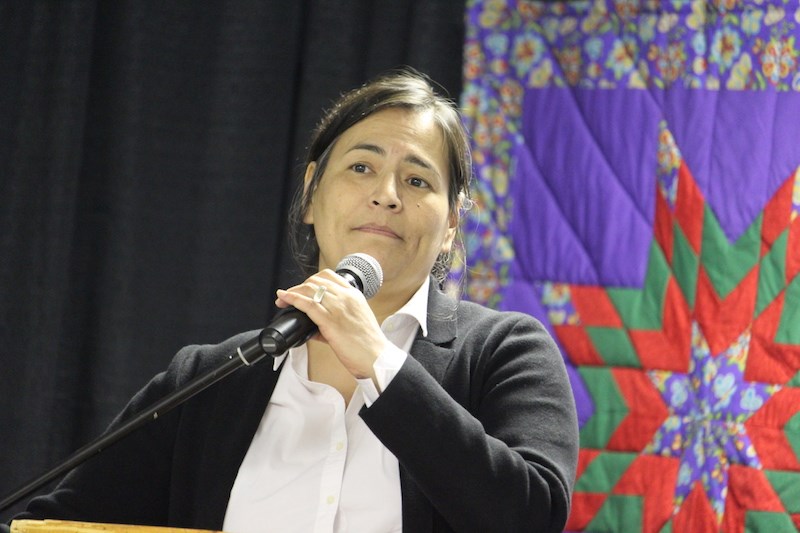After four years and thousands of testimonies, the national inquiry into Murdered and Missing Indigenous Women and Girls (MMIWG) published their final report on June 3.
To help make sense of the report’s findings and recommendations, MMIWG commissioner Michèle Audette visited St. Joseph’s Ukrainian Catholic Church in Thompson June 10 and fielded questions from members of the public.
Audette said the report’s calls for justice provide a road map on how Canadian governments at every level can help stem the tide of disproportionate violence committed against Indigenous women and girls in this country.
The inquiry came up with 231 such recommendations, covering a variety of areas including culture, human security, health and wellness and education.
One section of this document calls for the creation of a National Indigenous and Human Rights tribunal that works independently from the government and has the authority to receive complaints about human rights violations committed against Aboriginal people or groups.
Audette said these calls for justice will serve as an antidote to the short-term government planning that’s prevented any meaningful change from happening in the past.
“It doesn’t work anymore,” she said. “We need to have a long-term investment and we all know that. We have a tool here to remind Canada and every government that the long-term investment is one of the keys to real change.”
Nisichawayasihk Cree Nation Coun. Jacqueline Walker questioned the impact of these calls for justice during Monday’s forum, since she said the Truth and Reconciliation Commission’s recommendations from 2015 still haven’t been fully implemented yet.
While Audette shares these concerns about government inaction, she remains confident that they can hold their feet to the fire by establishing entities, like the human rights tribunal, that are specifically designed to make sure these objectives are being fulfilled.
“There is much to do, but let’s not panic,” she said. “It’s feasible, but we need commitment, we need the government to be honest with this. They [need to] start a dialogue with the leadership and the families of the survivors to make sure that, step by step, those calls for justice are implemented.”
Another audience member brought up the national inquiry’s use of the word “genocide” in their final report, and asked how they can convince others that this terms is an accurate description of Canada’s treatment of Indigenous women and girls.
Audette echoed the inquiry’s supplementary report on the issue by saying that the traditional definition of genocide, popularized by groups like the United Nations in the 1940s, originally excluded Indigenous voices and didn’t take into account factors like cultural erasure and sexual violence that were facilitated through Canadian institutions like residential schools.
“So, of course, when we bring the truth of the women and the men here in Canada of what’s happened for past 500 years it doesn’t fit because it was set up to create that … definition that Rwanda is a genocide and other places where there are massacres,” she said.
Audette encouraged everyone to consult with inquiry’s supplementary report on the use of the word genocide, since it provides modern legal opinions and alternative definitions that bolster their argument.
Monday’s community forum also featured guest representatives from every level of government. This group included Thompson Mayor Colleen Smook, Thompson MLA Kelly Bindle and Churchill-Keewatinook Aski MP Niki Ashton, who all pledged to support this ongoing process.
“This inquiry makes it clear that it’s not good enough to talk about the problem, that there must be action, and comprehensive action, now,” said Ashton. “Today also marks the beginning of the next chapter and I believe it is incumbent on all of us to certainly commit to the over 200 recommendations and to ensure that our governments, whether it’s federal, provincial, municipal, are held to account and are part of the solution.”
To read the national inquiry’s final report in full, please visit their website at www.mmiwg-ffada.ca.




